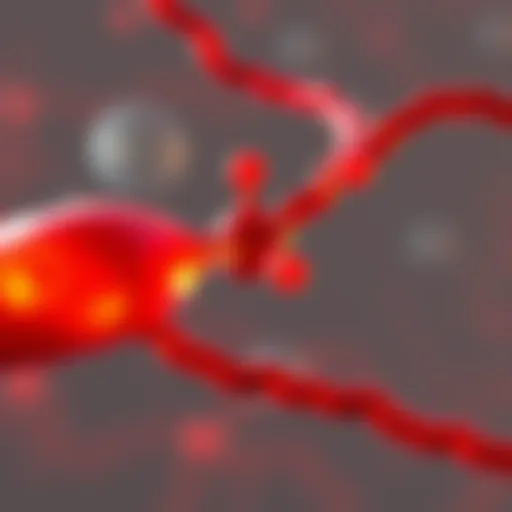Expert Tips for Soothing a Dry and Itchy Scalp Naturally


Well-Being Overview
Dry, itchy scalps can be a common source of discomfort and frustration for many individuals. Addressing this issue goes beyond mere external treatment; it delves into a fundamental aspect of overall well-being - scalp health. Understanding the causes and solutions for dryness and itchiness is vital, not only for physical comfort but also for boosting confidence and self-care practices.
Physical Wellness
When it comes to combating a dry, itchy scalp, physical wellness plays a crucial role. Implementing a regular exercise routine can stimulate blood flow to the scalp, promoting hair health and hydration. Additionally, incorporating nutrient-rich foods into your diet can provide essential vitamins and minerals that contribute to overall scalp health. Ensuring that your body is in optimal condition can help alleviate scalp issues and promote a healthy environment for hair growth.
Nutrition for Nourishment
A balanced diet is key to nourishing your scalp from within. Including foods rich in vitamins A, C, D, and E can support scalp health and combat dryness. Leafy greens, citrus fruits, nuts, and seeds are excellent choices to incorporate into your meals. Experimenting with easy and healthy recipes that feature these ingredients can not only improve your scalp condition but also enhance your overall well-being.
Mindfulness & Self-Care Practices
In the quest for a healthier scalp, mindfulness and self-care practices can be powerful tools. Taking time to relax and recharge can reduce stress levels, which in turn can help alleviate scalp discomfort. Engaging in mindfulness techniques such as meditation or deep breathing exercises can promote relaxation and overall well-being. Balancing work responsibilities with moments of self-care is essential for maintaining a healthy scalp and a positive mindset.
Mental Health Matters
The link between mental health and scalp condition is undeniable. Stress and anxiety can exacerbate scalp issues, leading to increased dryness and itchiness. Implementing strategies to improve mental well-being, such as regular exercise, adequate sleep, and social connections, can have a positive impact on scalp health. Developing coping mechanisms for stress and anxiety can not only benefit your mental state but also contribute to a healthier scalp.
Understanding the Root Cause of Dry, Itchy Scalp
In delving deep into the complexities of understanding the root causes of a dry, itchy scalp, this article aims to shed light on the pivotal role this knowledge plays in addressing scalp discomfort. By comprehensively exploring the various factors that contribute to dryness and itchiness, individuals can develop a holistic approach towards scalp health maintenance. Understanding the root cause armors readers with the necessary information to identify triggers specific to their condition, steering them towards tailored solutions for long-term relief and improved scalp well-being.
Common Causes of Scalp Dryness and Itchiness


Dry Weather and Low Humidity
Discussing the impact of dry weather and low humidity on scalp health reveals their significance in the overarching theme of combating dry, itchy scalp issues. The characteristic dryness associated with these environmental factors can exacerbate existing scalp conditions or trigger discomfort in individuals predisposed to such concerns. Understanding the effects of dry weather and low humidity helps individuals preemptively adjust their hair care regimen to mitigate potential scalp issues they may face.
Skin Conditions like Psoriasis or Eczema
Exploring skin conditions like psoriasis or eczema brings to light the intricate relationship between these dermatological concerns and scalp discomfort. The prevalence of these conditions underscores the importance of differentiating between general dryness and underlying skin conditions that may necessitate specific treatment approaches. Recognizing the unique manifestations of such conditions on the scalp equips individuals with the knowledge to seek tailored remedies from healthcare professionals.
Overuse of Harsh Hair Products
Delving into the repercussions of overusing harsh hair products clarifies their role in perpetuating scalp dryness and itchiness. The aggressive ingredients present in many commercial hair care products can strip the scalp of its natural oils, disrupting its moisture balance and triggering adverse reactions. Acknowledging the impact of product overuse prompts individuals to scrutinize ingredient labels and opt for gentler, scalp-friendly alternatives.
Scalp Infections
Exploring scalp infections illuminates how underlying microbial factors can contribute to scalp discomfort. The unique challenges posed by infections require targeted treatments to address the root cause and alleviate symptoms effectively. Recognizing the signs of a scalp infection enables individuals to seek timely intervention, preventing the condition from escalating and causing further disruption to scalp health.
Impact of Diet and Hydration on Scalp Health
Importance of Hydrating Your Body
Diving into the importance of adequate hydration for overall scalp health underscores the essential role water plays in maintaining scalp moisture balance. The correlation between hydration levels and scalp condition emphasizes the need for individuals to prioritize internal hydration alongside external treatments for optimal results. Understanding the impact of hydration on scalp health motivates individuals to adopt habits that support their body's water needs, translating into improved scalp comfort and appearance.
Incorporating Omega- Fatty Acids
Unpacking the benefits of incorporating omega-3 fatty acids into one's diet sheds light on their potential in alleviating scalp dryness and itchiness. The unique properties of these essential fatty acids offer anti-inflammatory benefits that can positively impact scalp health. Recognizing the advantage of dietary interventions involving omega-3 fatty acids empowers individuals to make informed choices that support their scalp's overall well-being.


Avoiding Trigger Foods
Analyzing the impact of trigger foods on scalp health elucidates the role dietary choices play in exacerbating or ameliorating scalp conditions. Understanding how certain foods can trigger inflammatory responses that manifest on the scalp aids individuals in making conscious decisions about their dietary intake. Awareness of trigger foods enables individuals to proactively manage their diet to minimize potential flare-ups, fostering a harmonious environment for scalp health maintenance.
Effective Remedies for Alleviating Scalp Discomfort
When it comes to addressing scalp discomfort, the section on Effective Remedies for Alleviating Scalp Discomfort plays a crucial role in this article. By exploring natural home treatments and commercial scalp care products, individuals can find relief from the unpleasant symptoms associated with dryness and itching. This section serves as a comprehensive guide, highlighting practical solutions that aim to enhance scalp health and overall well-being.
Natural Home Treatments
Coconut Oil Massage
In the realm of natural home treatments, the Coconut Oil Massage stands out as a prominent solution for alleviating scalp discomfort. Coconut oil's unique composition rich in fatty acids and nutrients makes it a beneficial choice for nourishing the scalp and hair. The key characteristic of Coconut Oil Massage lies in its ability to moisturize the scalp, reducing dryness and itchiness. Despite being a popular option, one should consider the heaviness of coconut oil, which might not suit all hair types. Nevertheless, its deep conditioning properties make it an ideal candidate for promoting scalp health in this article.
Aloe Vera Gel Application
Another noteworthy natural remedy is the Aloe Vera Gel Application, known for its soothing and healing properties. Aloe vera's gel-like consistency provides a cooling effect on the scalp, relieving itchiness and irritation. The key characteristic of Aloe Vera Gel lies in its ability to hydrate the scalp effectively, promoting a balanced environment for healthier hair growth. While Aloe Vera Gel is a popular choice for scalp care, individuals should be cautious of potential allergic reactions. However, its anti-inflammatory benefits make it a valuable inclusion in this article.
Apple Cider Vinegar Rinse
Lastly, the Apple Cider Vinegar Rinse emerges as a unique yet effective natural treatment for scalp discomfort. Apple cider vinegar's acidic nature helps to balance the scalp's p H levels, reducing itchiness and flakiness. The key characteristic of Apple Cider Vinegar Rinse is its clarifying properties, aiding in removing build-up and impurities from the scalp. Despite its strong odor, this remedy's ability to restore scalp health and shine makes it a popular choice for individuals seeking relief in this article.
Commercial Scalp Care Products
Moisturizing Shampoos and Conditioners


When considering commercial scalp care products, Moisturizing Shampoos and Conditioners play a significant role in promoting scalp health. These products offer added hydration to the scalp, combatting dryness and promoting soft, manageable hair. The key characteristic of Moisturizing Shampoos and Conditioners lies in their ability to replenish moisture without weighing down the hair. While these products are favored for their nourishing properties, individuals with oily scalp types should use them sparingly. Nevertheless, the benefits of maintaining scalp hydration make them a valuable addition to this article.
Medicated Shampoos with Zinc Pyrithione
For those dealing with scalp conditions like dandruff, Medicated Shampoos with Zinc Pyrithione come to the rescue. Zinc pyrithione is known for its anti-fungal and anti-bacterial properties, effectively treating flakiness and itchiness. The key characteristic of Medicated Shampoos with Zinc Pyrithione is their therapeutic impact on scalp ailments, providing relief and preventing recurrence. Despite some products drying out the hair, the targeted treatment these shampoos offer renders them a beneficial choice for individuals looking to combat scalp discomfort in this article.
Scalp Serums and Treatments
In the realm of specialized care, Scalp Serums and Treatments offer concentrated solutions for specific scalp concerns. These products are formulated with potent ingredients that target issues like dryness, irritation, and inflammation. The key characteristic of Scalp Serums and Treatments is their efficacy in addressing scalp issues at a deeper level, promoting long-term scalp health. While some treatments may be pricier, their effectiveness in rejuvenating the scalp makes them a worthwhile investment for individuals seeking lasting relief in this article.
Lifestyle Tips for Maintaining a Healthy Scalp
Maintaining a healthy scalp is crucial for overall hair health. A scalp care routine can significantly impact the appearance and feel of your hair. Lifestyle tips play a vital role in ensuring your scalp remains healthy and nourished. From avoiding excessive hair washing to incorporating scalp exfoliation techniques, these tips can promote scalp health by maintaining its natural oils and balance.
Scalp Care Routine Recommendations
Avoiding Excessive Hair Washing
Avoiding excessive hair washing is essential for preserving the scalp's natural oils. Over-washing can strip the scalp of its natural moisture, leading to dryness and irritation. By reducing the frequency of hair washing, you allow the scalp to maintain its natural balance, resulting in healthier hair growth and reduced scalp discomfort. It is a popular choice among those looking to improve scalp health and promote overall hair vitality.
Scalp Exfoliation Techniques
Scalp exfoliation involves gently removing dead skin cells and buildup from the scalp. This process helps unclog hair follicles, promoting better blood circulation and nutrient absorption. Scalp exfoliation is a beneficial practice for enhancing scalp health and stimulating hair growth. While it offers advantages in boosting scalp rejuvenation, excessive exfoliation can lead to scalp sensitivity, so moderation is key to reaping its benefits.
Protecting Your Scalp from Sun Exposure
Shielding your scalp from sun exposure is essential to prevent sunburn and other skin damage. Just like your skin, your scalp is susceptible to UV rays, which can lead to scalp dryness and discomfort. Using protective measures such as wearing a hat or applying sunscreen on exposed areas can safeguard your scalp from sun damage. While sun exposure is important for vitamin D synthesis, moderation and protection are key to preserving scalp health.
Stress Management for Improved Scalp Health
Stress management plays a significant role in maintaining optimal scalp health. High-stress levels can trigger inflammation and exacerbate scalp conditions such as dandruff and itchiness. Practicing relaxation techniques helps reduce stress hormones, promoting a healthier scalp environment. Incorporating mindfulness meditation into your daily routine can further enhance stress resilience and contribute to improved scalp health. A calm and balanced mind is essential for nurturing a healthy scalp, showcasing the interconnectedness of mental well-being and scalp health.



